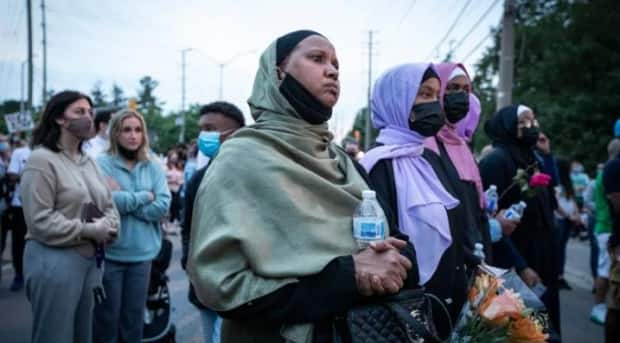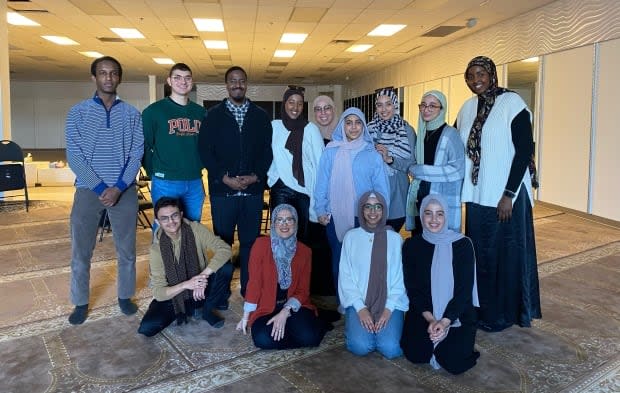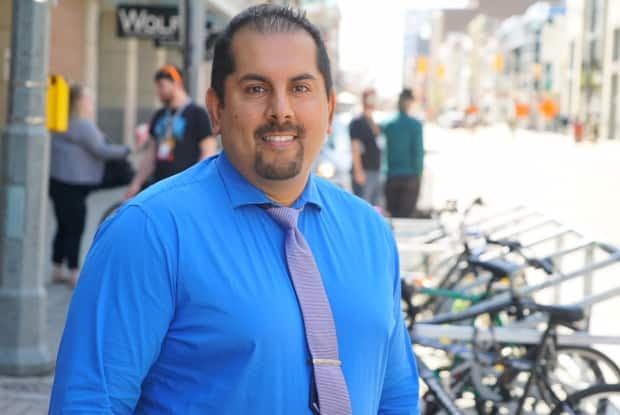Anti-Islamophobia rep Amira Elghawaby says in London, Ont., she'll continue to call out discriminatory laws

A few weeks after apologizing for comments in a 2019 opinion piece, Canada's anti-Islamophobia representative began an official tour of communities with a stop in London, Ont., where a Muslim family was killed in June 2021 in what police describe as a hate-motivated attack.
"The call for the creation of a special office to combat Islamophobia came from Muslim communities across Canada, but most strongly from London Muslim communities," Amira Elghawaby said in an interview with London Morning's Rebecca Zandbergen on Monday after her weekend stop.
"I knew that I had to come to London."
Elghawaby started her post as the country's first representative to combat Islamophobia amid controversy in late January.
In 2019, Elghawaby and Bernie Farber, former chief executive officer of the Canadian Jewish Congress, co-authored an opinion piece commenting on Quebec's controversial Bill 21, which bans provincial public servants from wearing religious symbols such as hijabs.
"Unfortunately, the majority of Quebecers appear to be swayed not by the rule of law, but by anti-Muslim sentiment," Elghawaby and Farber wrote.

Elghawaby eventually apologized for her remarks, after Conservative Leader Pierre Poilievre and a number of other politicians who accused her of anti-Quebec sentiments called for her removal from the position.
Some Muslims in London, Ont., still 'frightened'
On the weekend, she met with about 200 members of London's Muslim community and told London Morning that she heard a variety of messages, about the support Muslims felt in the wake of the attack against the Afzaals and the progress the London is making — it recently hired a Muslim liaison officer — but also about the lingering fears in the community following the deadly truck attack of the Afzaal family.
Yumna Afzaal, 15, her parents Madiha Salman, 44, and Salman Afzaal, 46, and her grandmother, Talat Afzaal, 74, were killed while they were out for a Sunday walk.
A man has been charged and is expected to go to trial in September.
"I met Muslim women who say that if there's a loud sound as they're walking in the streets that they feel frightened," Elghawaby told London Morning.
"One young woman told me about her son feeling so frightened by loud noises that he'll still push his mom into the sidewalk, away from the road."
Elghawaby also vowed to continue to call out problematic legislation.
"Bill 21 does discriminate against people who wear visible religious symbols and there is a disproportionate impact on Muslim women who wear the headscarf," she said.
"As I've said and I will continue to say, that does discriminate; it does discriminate against certain members of Quebec society."

Elghawaby said London was her first stop in an official capacity and she'll be visiting other communities across Canada in the coming few months.
She said her job is to influence the federal government to ensure Islamophobia doesn't creep into legislation.
"I'm ready to have those difficult conversations and address the way that various pieces of legislation and policies in Canada may have a negative impacts on Muslim communities."
Call for Criminal Code update to define hate crime
London lawyer Nawaz Tahir, chair of the Muslim advocacy group the Hikma Public Affairs Council, said he's disappointed that Elghawaby's tenure had a rocky start.

"I thought it was unfortunate that she was called to apologize for calling out what a judge has already said is a discriminatory bill and for pointing out that a survey of Québécois actually found that there was a majority of support for Bill 21," he said.
However, Tahir added, he's encouraged she made her first stop in London and said her work now is important.
"I think the critique of Amira just speaks volumes to why her role is needed and while Islamophobia exists around the country, Bill 21 certainly is a symbolic manifestation of that piece."
Tahir also wants to see the Criminal Code updated to include a clearer definition of what constitutes a hate crime.


